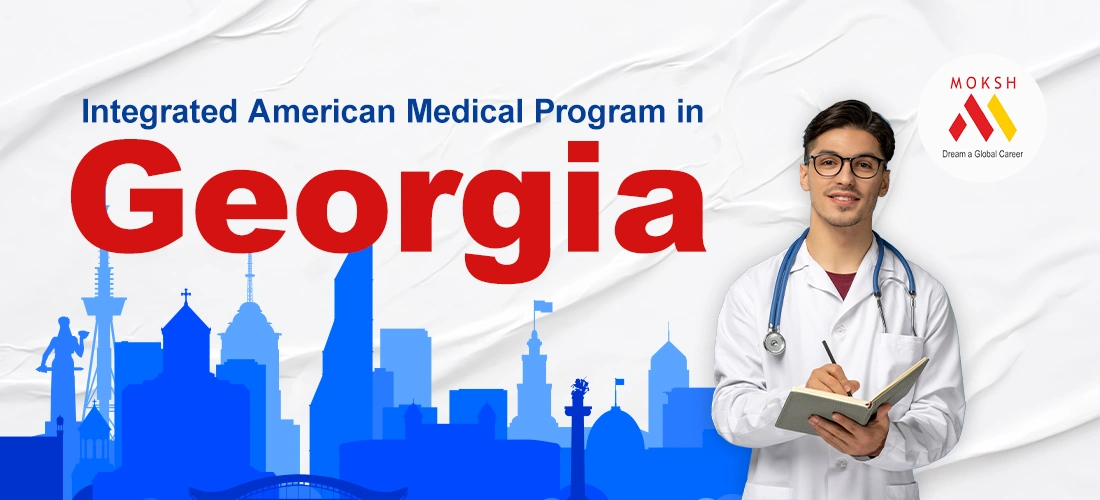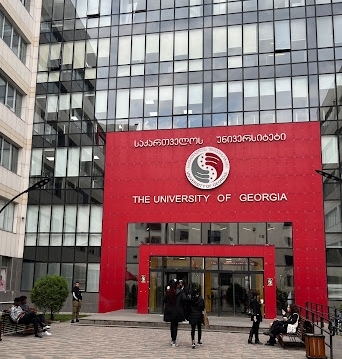
Roadmap
What is the European MBBS in Georgia program?
Under the standard European MBBS in Georgia program provided by all the Georgian medical colleges, students complete MBBS in Georgia completes the course and gathers 360 credits. Further, the students need to take the FMGE or NExT exam to obtain their licence to practice medicine in India. After obtaining their licence, they can pursue specialization leading to an MD degree post MBBS in Georgia.
On completion of the MBBS in Georgia course, hardly 20% of the students are able to clear FMGE in India and out of these only 2% of the students are able to get a PG seat, the students at University of Georgia or Tbilisi State Medical University prefer to opt for the Integrated American Program. Rest of the colleges to study medicine in Georgia do not offer such options.
What is the Integrated American Program (IAP)?
Generally the students opting to pursue MBBS in Georgia are offered European Medical Program leading to MD degree (Equivalent to MBBS in India). An Integrated American Program in Georgia additionally allows the medical students to prepare for entry into PG in the USA while they pursue MBBS in Georgia. Accordingly, it offers MBBS in Georgia + PG in USA program to all the international students.
The Integrated American Program is designed to prepare students for the USMLE exams and to practice medicine in the United States. Students in this program start preparing for the USMLE Step 1 exam right from the first year of study medicine in Georgia. The USMLE exam prep course is integrated with the standard MBBS program, and students typically take the Step 1 exam at the end of their third year of MBBS. USMLE Step 2CK exam preparation begins in the fourth year, and students typically take this exam in their fifth year.
Finally, in their final year during MBBS in Georgia, students complete a US hospital clerkship and all of the requirements for applying for ECFME certification, which leads to residency applications for their medical PG course in the USA.
Which program is right for you?
Choosing the right program for you is a very important factor. Those students who are looking to pursue only up to MBBS in Georgia to become a General Physician may take up European Medical Program and prepare for FMGE while studying at University of Georgia.
However, those students aiming to to study medicine in Georgia and become a specialists such as Cardiologist, Anesthesiologist, Gynaecologist etc and settle down in USA always join the Integrated American Program. For students who wish to practice medicine in the USA as a specialist, it is important to choose the top Georgia medical universities providing Integrated American program is the best choice.
The major reason of attraction is the high residency stipend averaging US$ 65,000 per year (INR 55 Lacs per year ) while pursuing your PG level medical program. The Georgia MBBS Fees are much lesser in comparison with the income during residency in USA. On the other hand a medical PG seat in India in a private medical college costs you Rs. 1.50 Crore!
Here is a table that summarizes the key differences between the two programs:
| Feature | European MBBS course | Integrated American Program |
|---|---|---|
| Target | MBBS in Georgia | MBBS in Georgia + PG in USA |
| Curriculum | European medicine course | European medicine course + USMLE exam prep |
| USMLE exam prep | Not integrated | Integrated |
| Eligibility for residency in the USA | Spend additionally 3 years after passing NExT in India | Immediately after graduation |
| University of Georgia Fees | US$ 6,000 per year | US$ 9,000 per year* |
*Scholarships for the first 100 students available!
The students looking to study MBBS in Georgia may note that only 2 top universities in Georgia to study MBBS provide this special Integrated American Program.
Georgian Universities offering Integrated American Programs

Integrated Medical Program needs infrastructure to match top ranked American medical schools. Accordingly, only 2 universities in Georgia are offering MBBS in Georgia + PG in USA course. The best university in Georgia for MBBS namely Tbilisi State Medical University and the top private MBBS college namely University of Georgia, Tbilisi are the only two colleges authorized to run such integrated American program while the student pursue MBBS in Georgia.
Many MBBS abroad agents or MBBS in Georgia consultancy have duped you by saying that other colleges also provide USMLE coaching while pursuing MBBS in Georgia. However, the student must get the admission letter from the university confirming the same before accepting their claims.
Further it is suggested that all the offer letters needs to be verified by the student with the Georgia MBBS university since many agents have been caught providing bogus admission letters!
Other universities, such as:
- Georgian National University (SEU)
- Caucasus International University
- European Medical University, Georgia
- David Tvildiani Medical University (DTMU)
- Geomedi University, Georgia
These colleges offer standard European Medical programs and not authorized to conduct American Program which is very common.
Cost of Integrated American Program (IAP) at University of Georgia
The cost of pursuing an MBBS degree at the University of Georgia, Tbilisi, is relatively affordable. With a budget of around INR 40 Lacs, including living costs (accommodation and food), students can pursue MBBS in Georgia + PG in the USA.
The University of Georgia Tbilisi MBBS Fees are an affordable option called the Integrated American Program (IAP). This unique program helps students prepare for the United States Medical Licensing Examination (USMLE), which is necessary to become a practicing doctor in the United States.
Check out the comprehensive tuition fee structure for the MBBS program at the University of Georgia MBBS Fees for the 2024 academic year.
| Year | Tuition Fee (USD) | Scholarship* (USD) | Final Tuition Fees (USD) |
|---|---|---|---|
| Yr 1 | US$ 9000 per year | US$ 2,000 per year | US$ 7,000 per year |
| Yr 2 | US$ 9000 per year | US$ 2,000 per year | US$ 7,000 per year |
| Yr 3 | US$ 9000 per year | US$ 2,000 per year | US$ 7,000 per year |
| Yr 4 | US$ 9000 per year | US$ 2,000 per year | US$ 7,000 per year |
| Yr 5 | US$ 9000 per year | US$ 2,000 per year | US$ 7,000 per year |
| Yr 6 | US$ 9000 per year | US$ 2,000 per year | US$ 7,000 per year |
| Total | US$ 54,000 for 6 years | US$ 12,000 for 6 Years | US$ 42,000 for 6 years |
As you can see, the cost of MBBS in Georgia for the American Program is slightly higher than the tuition fee for the European MBBS program at the University of Georgia. However, the IAP scholarship covers the difference in this cost and the student is ready for the PG in USA while graduating in medicine.
The biggest outcome of MBBS in Georgia at of integrated American Program at University of Georgia is earning stipend during PG in USA equivalent to US$ 60,000 after spending around US$ 60,000 (including tuition fees, accommodation & living costs) for MBBS at the top medical university in Georgia. The cost of doing MBBS in Georgia is repaid very easily while pursuing residency in USA.
Scholarship for MBBS at University of Georgia
Since the University of Georgia MBBS Fees is quite high for the American program, they have decided to provide scholarships to Indian students. Every year, the University of Georgia (UG) awards 100 international students scholarships valued at USD 12,000 to first 100 applicants for the Integrated American Program. The University of Georgia MBBS fees are lowered greatly due to this scholarship applicable for the American program.
MBBS in Georgia Fees Structure 2024-25
There are 23 medical universities in Georgia for international students. The MBBS in Georgia Fees structure for a European Medical program and Integrated American Program is very high but worth. With the scholarship, it gets even more attractive for the students to choose the integrated American Program since it prepares the students for PG in USA as a part of the MBBS journey.
The fees for MBBS in Georgia varies from one university to another. We give below the comparison of these costs for the Georgia MBBS colleges.
| University | MBBS(Tuition Fees) | MBBS + PG (Tuition Fees) | Scholarship | Tuition Fees | Difference |
|---|---|---|---|---|---|
| TSMU | US$ 8,000 | US$ 13,500 | 0 | US$ 13,500 | US$ 5,500 |
| Univ of Georgia | US$ 6,000 | US$ 9,000 | US$ 2,000 | US$ 7,000 | US$ 1,000 |
| SEU | US$ 5,000 | Not Available | 0 | US$ 5,000 | NA |
| Caucasus | US$ 5,500 | Not Available | 0 | US$ 5,500 | NA |
| DTMU | US$ 8,000 | Not Available | - | US$ 8,000 | NA |
| European University | US$ 6,000 | Not Available | - | US$ 6,000 | NA |
As one can see that there is hardly any cost difference between the Georgia medical university fees for European Medical Program and Integrated American program at University of Georgia. However, the difference is huge between the American program at TSMU and the UG American program. It leads to the conclusion that the students choosing University of Georgia, should only opt for the Integrated American program and not the European Medical Course! Apart from the above medicine in Georgia fees, the students should have sufficient funds towards the cost of studying MBBS in Georgia including accommodation and living costs in the range of US$ 3,000 per year throughout the duration of MBBS in Georgia.
MOKSH is the exclusive and official representative of University of Georgia in India and GCC countries for Integrated American program. You can now study at Georgia top medical college and practise in USA!
Cost comparison for Integrated American Program in Georgia
Here is a comparison of the costs of the Integrated American Program at Tbilisi State Medical University (TSMU) and the Integrated American Program at the University of Georgia (UG) :
| University | Tuition Fees (USD) | Scholarship | Final Fees (USD) | Total Cost for 6 Years (USD) | Total Cost for 6 Years (INR) |
|---|---|---|---|---|---|
| Tbilisi State Medical University | USD 13,500 | 0 | USD 13,500 | 81,000 | INR 65,00,000 |
| University of Georgia fees | USD 9,000 | USD 2,000 | USD 7,000 | USD 42,000 | INR 32,50,000 |
Both these universities offering to study medicine in Georgia have their campuses in the center of the Tbilisi city. However, the integrated American program at the University of Georgia MBBS fees are half of American program at TSMU. Further, the tuition fees for standard European medical course is US$ 8,000 per year which is higher than the cost of an Integrated American Program at University of Georgia. It is important to check the program before looking for the Georgia MBBS Fees.

The University of Georgia, Tbilisi
Established in 2004, the University of Georgia (UG) is a leading medical school in Georgia. UG offers comprehensive Bachelor's, Master's, and Ph.D. programs in health sciences and public health, including Health Care Administration, Pharmacy Management, Nursing, Public Health, and single-cycle Dental Studies and Medical Education programs. In 2024, around 2,800 international students have chosen to study medicine in Georgia at this university.
UG is considered to be the best medical university in Georgia country due to its focus on developing diagnostic skills among medical students to ensure critical thinking and patient-centered learning while they study MBBS in Georgia. In addition, top doctors from Georgia teach UG's medical students, who come from over 70 countries. Currently, there are more than 2,000 students at UG. The low cost of University of Georgia MBBS fees, it is a popular choice for students from India and Gulf countries over other Medical Schools in Georgia, such as Tbilisi State Medical University (TSMU).
The University of Georgia MBBS fees are as follows:
| Sr. No. | Program | Tuition Fee (USD) | Hostel & Living cost |
|---|---|---|---|
| 1 | European MBBS Course | US$ 6,000 per year | US$ 3,000 per year |
| 2 | Integrated American program | US$ 9,000 per year | US$ 3,000 per year |
With scholarship, the University of Georgia MBBS Fees for an Integrated American program would be just US$ 7,000. Overall, the Integrated American Program at the University of Georgia is a great option for students study MBBS in Georgia and practice medicine in India or the USA. Just 5.8 years of University of Georgia MBBS duration offers this advantage to start your PG in USA within 1 year of graduation!
American Program at Tbilisi State Medical University (TSMU)

The USMD program being conducted at TSMU is in collaboration with Emory School of Medicine, USA.
The strategic goal of the American MD (USMD) program at TSMU is to train internationally competitive and competent physicians having ability and behaviour required for PG in USA. The program objective is to provide competency based medical education (CBME) creating highly skilled and practical physicians ready for the American healthcare system. It supports the future self motivated doctors develop life long learning (LLL).
However, the TSMU Georgia fee structure for USMD program is very expensive and huge number of students transfers themselves after 1st or 2nd year to the European MBBS program since they do not see much values into the high cost!
| Sr. No. | Program | Tuition Fee (USD) | Hostel & Living cost |
|---|---|---|---|
| 1 | European MBBS Course | US$ 8,000 per year | US$ 3,000 per year |
| 2 | Integrated American program | US$ 13,500 per year | US$ 3,000 per year |
Majorly, the students from the gulf countries are lured to take admission to TSMU for American MD program (USMD). It must be understood that the program does not guarantee your entry into PG in USA even after spending Rs. 75 Lacs to become a doctor!

Advantages of Admission to Integrated American Program
The Integrated American Program (IAP) offers a fantastic opportunity for students interested in pursuing a medical career in the United States.
Here are some of the key benefits of pursuing the integrated program at the University of Georgia (UG):
- USMLE preparation: The IAP prepares students for the USMLE exam, which is essential for practicing medicine in the United States. It offers a comprehensive USMLE exam preparation course while you study MBBS in Georgia and includes clinical rotations in US hospitals to prepare students.
- Affordability: The Integrated American Program (IAP) at UG is budget-friendly. This program allows to study medicine in Georgia for international students and get settled in USA.
- Reputation: TSMU & UG are respected universities with a solid track record. All the required accreditation and approvals such as WFME, LCME, ECFMGE are available with both the universities. While its takes a huge cost of Rs. 3 Crores to study medicine in USA, the low Georgia country MBBS fees allows the Indian students to study MBBS in Georgia + PG in USA.
- Accreditation: University of Georgia has accreditation from the World Federation for Medical Education (WFME), ensuring a high-quality standard in the program.
The USMLE Step 1 & Step 2CK preparations as well as clearance are completed within the MBBS in Georgia duration keeping the students ahead of others in career!
In a nutshell, the program is affordable, accredited, and offers students the opportunity to prepare for the USMLE exam while you study medicine at the best medical universities in Georgia for international students..

Eligibility for MBBS in Georgia + PG in USA
To be eligible for admission to the University of Georgia MBBS program, applicants must meet the following criteria:
- Achieve at least 50% in Physics, Chemistry, and Biology (PCB) in Class XII.
- Be at least 17 years old
- Qualify for the NEET exam for the application year
- Basic proficiency in English (may be assessed during an interview)
With this eligibility, the students can get enrolled for the entire MBBS duration in Georgia.
Study MBBS in Georgia without NEET
To study MBBS in Georgia without NEET is not possible for European Medical Program since they cannot return back to India and appear for FMGE / NExT exam. The NEET unqualified students will not be allowed to appear for FMGE / NExT.
If you wish to study medicine in Georgia with a low Georgia MBBS fees, there only option is to pursue the US or UK Pathway for Medical PG by passing the USMLE or PLAB. Accordingly, The Integrated American Program at the University of Georgia is a good option for students who have not qualified for the NEET exam.
Integrated American Program : Admission Deadlines 2024 - 25
The University of Georgia (UG) as well as Tbilisi State Medical University American Program offers two intakes per year for its MBBS in Georgia program: Autumn and Spring. The application deadlines for each intake are as follows:
| Intake | Batch | Last Date to Apply |
|---|---|---|
| Autumn | September, 2024 | June 30, 2024 |
| Spring | March, 2025 | 1st Jan, 2025 |
The admission process to study Medicine in Georgia for University of Georgia and enrolment to TSMU American program for the begins on 1st April and ends in September every year. It is important to note that the invitation letter from the Ministry of Education to study MBBS in Georgia takes at least 4-5 weeks to process.
Additionally, the embassy of Georgia in India takes around 4-8 weeks, or even longer, depending on the workload, to issue the study visa. Therefore, it is advisable to apply early. Applicants who are late in applying will generally be shifted to the spring batch, which starts in March every year.

Syllabus of Integrated American Program at the University of Georgia, Tbilisi
Below is a list of all subjects for each semester from the first to sixth years:
| Year | Courses | USMLE Step |
|---|---|---|
| 1st | Cell Biology, Body Systems, Biophysics and Medical Physics, Clinical and Professional Skills, Introduction to Information Technologies, Molecular Biology and Genetics, Body Function, Bioethics | USMLE Step 1 |
| 2nd | Body Systems, Anatomy, Physiology, Biochemistry, Histology, Imaging, Immunology, Body Function, Neuroscience, Introduction to Psychology, Clinical and Professional Skills, Skills for Academic Study, Public Health, Research Skills | |
| 3rd | Pathology, Pharmacology, Methods of Diagnosis, Microbiology, Public Health, Physical Diagnosis, Radiology, Laboratory Medicine, Immunology, Surgery (General) | |
| 4th | Internal Medicine, Surgery, Research Skills (Epidemiology and Biostatistics), Dermatology, Pediatrics, Clinical and Professional Skills, Surgery, Infectious Diseases Public Health, Leadership in Healthcare | |
| 5th | Internal Medicine, Neurology, Surgery, Forensic Medicine, Clinical and Professional Skills, Public Health, Psychiatry, Surgery, Clinical and Professional Skills, Obstetrics and Gynaecology, Research Skills (Evidence-Based Medicine), Elective Courses, Child Neurology, Quality and Safety in Healthcare | USMLE Step 2CK & Clerkship |
| 6th | Internal Medicine, Surgery, Medical Rehabilitation and Physical Therapy, Clinical and Professional Skills, Clinical Radiology, Obstetrics and Gynaecology, Palliative Medicine, Anesthesiology and Intensive Care, Family Medicine and Geriatrics, Clinical and Professional Skills, Research Skills |
Conclusion
If you are choosing to study at either Tbilisi State Medical University or University of Georgia to study medicine in Georgia, it is better to choose an Integrated American Program and not the standard European offered by the university. During Georgia MBBS course duration itself, both these universities allow the students to prepare for their CV to apply for the residency in USA.
Further, among the two options of the universities providing MBBS in Georgia + PG in USA, it is cost effective to choose University of Georgia since it costs half of Tbilisi State Medical University American Program!









